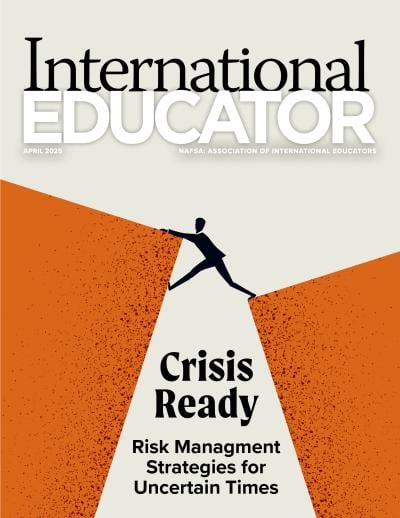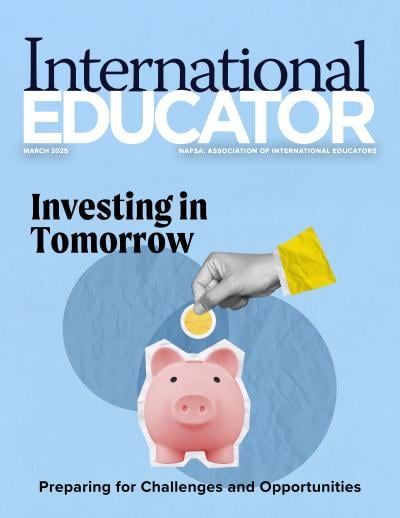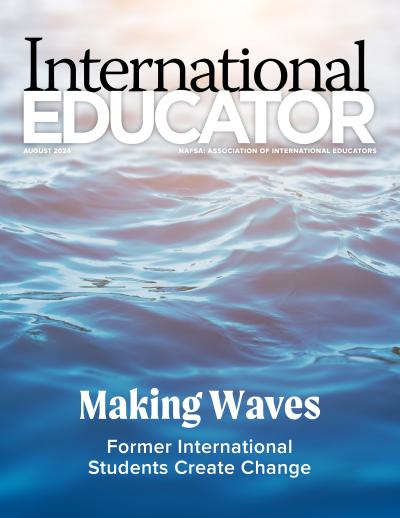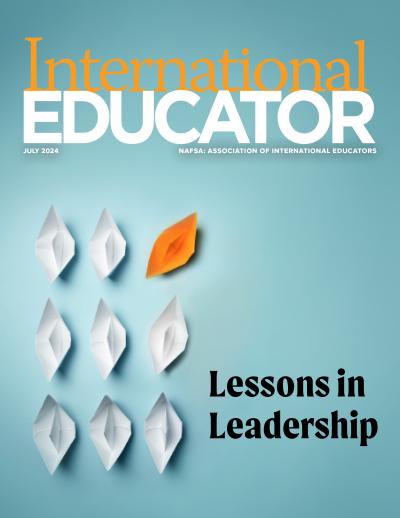The Values that Help Us Reimagine Our Work

Reflecting on the past 3 years, the many ways that COVID-19 has rapidly changed the landscape of higher education are uncountable. We were forced to move our work online with little time to prepare for this new reality. As international educators, we have all been required to reimagine our approaches to international recruitment and admissions, health and safety, and education abroad.
In my case, where I serve as the director of international training and development programs at Montana State University, this has meant creating intercultural and other learning experiences for our international training program participants and our university students, faculty, and staff during a time when we were not able to meet face to face. As we gradually come back to in-person programming, I’m realizing that what we once thought “normal” may forever be altered. An unexpected consequence of this world shift is that we have developed programming modalities which are arguably more inclusive, flexible, and far-reaching. As I reimagine my work, I’m guided by the values of adaptability, collaboration, and impact.
Adaptability
Technology has no doubt created a more interconnected and globalized world. Over the past couple of years, as international educators have adapted to embrace online learning and engagement to an unprecedented extent, there is a new capacity to broaden access to our programming. This applies to students and professionals who are unable to leave their families and those who may not have the financial means of supporting themselves while abroad.
Through my role as one of the three representatives to the United Nations for NAFSA, we postponed our youth representative program for 2 years since the UN was not holding in-person meetings or events. This temporary setback to our original program design was frustrating at first, but also allowed us the gift of time and the space to step outside our conventional programming. As a result, we created online course modules for students to learn more about the UN and its processes and inner workings. At the end of the course, we accompanied students virtually to online sessions offered by the UN.
This newly developed open-access online course and program design allowed access for more students across the United States and the world, especially when combined with our traditional model of working with students who are located near the UN in the New York/New Jersey area.
At Montana State University, our programs have traditionally centered around face-to-face exchange programs for students and professionals to advance their skills and expertise. When we were forced to stop conducting these programs in person, we needed to quickly adapt to the situation. We took our training program cohorts online, trying all the new and different ways to make the sessions as engaging as possible. Moreover, we seized the opportunity to host online alumni reunion programs to strategically connect with our past program participants in hopes of showing solidarity during an uncertain time and expressing our support and continued commitment to collaborate.
Collaboration
Working together often yields better results than striking out on your own. In addition to the above-mentioned student course, our UN Special Interest Group (UN SIG) at NAFSA is collaborating with the Teaching, Learning, and Scholarship Knowledge and the Sustainability SIG to create an additional online course geared toward university international education administrators. As we start shifting our UN programming back to in-person, we want to make sure that we preserve the hard work that went into designing these online courses.
By collaborating with other NAFSA groups, we can develop coursework that enables international administrators taking the course to map out a curriculum and work with faculty on research related to the UN’s 17 Sustainable Development Goals (SDGs). The SDGs are a great mechanism to focus campus internationalization on diversity, equity, and inclusion; education abroad; teaching, learning and scholarship; and other goals we work to include in our daily efforts. Our partnership to create the online course brings these goals to life.
Impact
As we move into the new year, I hope to continually utilize my passion, energy, and knowledge to create a more meaningful impact on my organization and our local and international partners. As the world grows more fractured and polarized, the need for global citizenship, diplomacy, and cultural humility are becoming increasingly essential. We need to work together to strengthen compassion, trust, transparency, and accountability to create international leaders who will strive to focus on positive change.
I am thankful that we had the opportunity to step back, rethink, and modernize the way that we approach our everyday work and programming. I believe strongly in the importance of in-person exchange programs for language learning, relationship building, and hands-on skill development, but I also look forward to finding more ways to make a transformative impact with the continued use of technology and hybrid models. These online methods are great for conducting online pre-program orientations, facilitating meaningful online networking opportunities, employing online platforms for interactive learning, and ultimately making our programs more accessible, affordable, and inclusive. I want to empower our training participants with the skills and resources needed to adapt to the coming changes that will take place throughout their careers and prepare them for the important work of solving the world’s evolving problems, and creating positive impact, together.
Years from now looking back on my career in international education, I hope that if nothing else, I will be able to describe the role I played in leaving a positive impact on the world, guided by these three values. •
Janelle Rasmussen is the director of international training and development programs at Montana State University's Office of International Programs.
About International Educator
International Educator is NAFSA’s flagship publication and has been published continually since 1990. As a record of the association and the field of international education, IE includes articles on a variety of topics, trends, and issues facing NAFSA members and their work.
From in-depth features to interviews with thought leaders and columns tailored to NAFSA’s knowledge communities, IE provides must-read context and analysis to those working around the globe to advance international education and exchange.
About NAFSA
NAFSA: Association of International Educators is the world's largest nonprofit association dedicated to international education and exchange. NAFSA serves the needs of more than 10,000 members and international educators worldwide at more than 3,500 institutions, in over 150 countries.
NAFSA membership provides you with unmatched access to best-in-class programs, critical updates, and resources to professionalize your practice. Members gain unrivaled opportunities to partner with experienced international education leaders.















